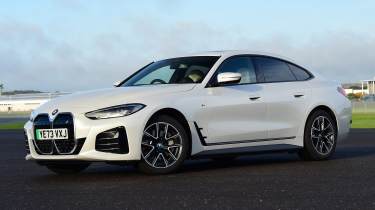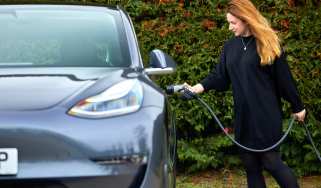Company car tax 2025: benefit-in-kind (BiK) rates explained
Company car tax is calculated using multiple factors, including the cost and emissions of the vehicle

Company car tax applies when your employer provides you with a car that you can use for personal travel. While it’s a perk that many employees appreciate, HMRC views it as a benefit-in-kind (BiK), so it comes with tax implications. The amount you pay is determined by several factors, including the car’s value, emissions, and your income.
At its core, company car tax works by calculating a percentage of the car's list price. This percentage varies depending on the car's CO2 emissions, with lower-emission vehicles attracting a lower rate of tax. The higher the emissions, the higher the tax rate.
Your salary also affects how much tax you pay – the more you earn, the higher your tax band. In some cases, driving an electric or hybrid car can significantly reduce the tax you pay, thanks to government incentives aimed at promoting low emissions vehicles. Once you’ve received your car, the tax contributions will come straight out of your payslip.
Having a company car comes with many benefits, including convenience, potentially lower costs for maintenance and insurance, and the ability to drive a more expensive car than you might otherwise be able to afford. However, it’s important to understand how BiK tax works to ensure you're fully aware of the costs involved.
How does company car tax work?
In the eyes of HMRC, private use of a company car (that includes commuting) is a perk, and it is classed as a benefit-in-kind (BiK). This effectively means that you’re receiving a financial benefit from your employer that isn’t part of your salary, and HMRC, therefore, taxes it separately (although it’s still deducted from your monthly pay ‘at source’).
In order to calculate how much company car tax you must pay per year, HMRC uses three figures:
- The ‘P11D’ value of your car – this is its list price, cost of delivery, VAT and optional extras (excluding road tax or first-year registration).
- The car’s benefit-in-kind (BiK) rate – based on CO2 emissions
- Your income tax band.
These figures are then plugged into the following formula:
P11D value (£s) x BiK rate (%) x Income tax band (%) = Annual tax payable
HMRC takes the P11D value of your car and multiplies it by its BiK rate. The result of this calculation gives HMRC a cash value of the ‘benefit-in-kind’ you are receiving from your employer. This value is then taxed according to your income tax band, which may be 0%, 20%, 40% or 45% for the highest earners (this differs in Scotland, where there is a wider range of rates from 19% to 46%.)
Originally BiK percentage bands were based solely on the value of the car, so the more expensive a model was, the more you were taxed on it. Nowadays, however, BiK rates also take into account a car’s CO2 emissions, so the lowest polluting cars attract less tax, relative to more polluting ones of similar P11D value. This is part of the government’s drive to encourage motorists to switch to greener cars. You can find a full table of BiK rates below.
As of April 2025, all fully electric cars are eligible for a 3% BiK rate. This is a huge subsidy, meaning employees can save thousands of pounds annually when their employers offer EVs as company cars. Plug-in hybrid cars with a lengthy electric-only range also benefit from a very low BiK rate.
BiK percentage bands are adjusted every financial year (this runs from April 6th to April 5th the year after), and the banding figures usually increase year on year. The BiK rate for electric cars is set to increase over time, so the subsidy won’t be quite as significant as it is today.
Company car tax example one: petrol car
As an example, let’s look at how much a BMW 3 Series saloon would cost to tax as a company car.

- A BMW 3 Series has a P11D value of £40,545.
- It emits 147g/km of CO2, so it falls into the 35% BiK band.
- Its BiK value is 35% of £40,545, which is £14,191.
- This figure is taxed according to your income tax band:
- 20% tax payers: £2,838 per year
- 40% tax payers: £5,676 per year
- 45% tax payers: £6,386 per year
Most companies will deduct the tax due from your monthly salary, spreading the cost over the year.
Company car tax example two: electric car
The company car tax system works identically for an electric car, but we’re including this example to highlight the savings that choosing a car in a lower BiK band will provide. We can compare the petrol-powered 3 Series with a similar car from BMW.

- An electric BMW i4 has a P11D value of £51,440.
- It emits 0g/km of CO2, so it falls into the 2% BiK band.
- Its BiK value is 3% of £51,440, which is £1,543.
- This figure is taxed according to your income tax band:
- 20% tax payers: £309 per year
- 40% tax payers: £617 per year
- 45% tax payers: £694 per year
By choosing an electric car – even one with a much higher P11D value – the resulting annual tax bill is considerably less.
Company car tax bands 2025/26
The table below outlines the benefit-in-kind rates for electric, petrol and diesel (RDE2 compliant) cars for the 2025/26 financial year. This applies until April 2026.
The electric range column applies to hybrid cars that emit less than 51g/km of CO2. Their BiK rate varies depending on how far they can travel on electric power alone. A PHEV with a range of 70 miles will receive a lower BiK rate than one that can only travel 40 miles.
| CO2 emissions (g/km) |
Electric range (miles) | BiK rate (%) |
| 0 | 3 | |
| 1-50 | 130+ | 3 |
| 1-50 | 70-129 | 6 |
| 1-50 | 40-69 | 9 |
| 1-50 | 30-39 | 13 |
| 1-50 | <30 | 15 |
| 51-54 | 16 | |
| 55-59 | 17 | |
| 60-64 | 18 | |
| 65-69 | 19 | |
| 70-74 | 20 | |
| 75-79 | 21 | |
| 80-84 | 22 | |
| 85-89 | 23 | |
| 90-94 | 24 | |
| 95-99 | 25 | |
| 100-104 | 26 | |
| 105-109 | 27 | |
| 110-114 | 28 | |
| 115-119 | 29 | |
| 120-124 | 30 | |
| 125-129 | 31 | |
| 130-134 | 32 | |
| 135-139 | 33 | |
| 140-144 | 34 | |
| 145-149 | 35 | |
| 150-154 | 36 | |
| 155-159 | 37 | |
| 160+ | 37 |
What changed in April 2025?
In April 2025, the benefit-in-kind rates increased. All cars that emit less than 160g/km of CO2, including electric and hybrid cars, received a 1% BiK rate increase. Electric cars are therefore now taxed at 3% instead of 2%.
Plug-in hybrids could be in store for much heftier BiK rates in 2025, too, and not because of rising BiK rates. Instead, the CO2 emissions testing procedure for PHEVs is set to become much stricter, potentially pushing them into a higher BiK bracket. You can read more about the PHEV emissions testing changes here.
It’s worth noting that VED (road tax) increased in April 2025, too. If you’re a company car driver, you won’t need to worry about this as it only applies to privately owned cars. But if you’re interested, you can read about the latest VED changes here.
What company car should I choose?
Given the substantial savings that electric company cars offer, it makes sense to opt for one of these if you can. Even if the car has a higher P11D value, the monthly tax bill could be a fraction of the cost of a similar petrol or diesel car. Even plug-in hybrids offer big savings compared to petrol and diesel cars, so long as they have a lengthy electric-only range.

The incentives for electric cars and PHEVs won’t be around forever, though. Their BiK rates increased by 1% from April 2025 and will increase by 1% year-on-year until 2028. From then on, PHEVs will be taxed at a much higher rate comparable to petrol cars.
While an EV is likely to be the most affordable company car at the moment in terms of BiK tax, some drivers will still find a petrol or diesel car more convenient. Not everyone has access to reliable or affordable charging, while an EV probably won’t suit a company car driver who covers long motorway miles.
Will I be taxed on company provided fuel?
If you use company provided fuel for personal miles – which includes commuting – then HMRC will tax you on that benefit too.
Working out your fuel benefit tax liability is based on an HMRC-set ‘multiplier’ for your company car’s BiK percentage. As of April 6th 2025, the multiplier is £28,200. For our notional BMW 3 Series example above you must multiply the car’s 35% BiK rate by £28,200, giving a figure of £9,870.
This cash value is then multiplied by your income tax band, so a 20% taxpayer would have an annual bill of £1,974 deducted from their salary by HMRC. If you do very little private mileage – i.e. use less than £1,974-worth of petrol – it’s worth giving up the free fuel benefit, as you’ll be taxed the full amount regardless.
Electricity provided to recharge a company EV, whether at home or in the office, is not currently taxed as a benefit by the HMRC.
Other factors influencing company-car tax
Some older diesel cars that don’t comply with the latest RDE2 emissions standards face a BiK rate 4% higher than petrols and RDE2-compliant diesels. However, every new diesel car registered since January 2021 meets these RDE2 emissions regulations and therefore isn’t subject to the additional 4%.
Making financial contributions to your company car scheme will lower your BiK rate, while employees who use their car part-time are also liable for less BiK tax. To find out how much of a reduction in company car tax you’re eligible for, use the company-car tax calculator on HM Revenue & Customs website: https://www.gov.uk/calculate-tax-on-company-cars
What is a car allowance?
Some companies offer the choice of a car allowance as an alternative to a company car. This is essentially a cash amount given to you each month to help with your personal motoring costs. As with anything, there are advantages and disadvantages to this.
A company car is likely to be renewed every few years and it’s possible that maintenance and any repairs will also be covered by the business, protecting you against any unexpected bills and hassle. If you choose a car allowance, you aren’t restricted to the list of cars offered by the company and can pay towards owning the car outright or buying a used car. Some companies may specify a vehicle age limit to qualify for their car allowance, so speak to your employer about any requirements they have.
A car allowance may also benefit anyone wanting to buy a higher-emissions vehicle, particularly those with a higher income who would prefer to drive a luxury or high-performance petrol car. Anyone who can commute in other ways or already owns a car (as long as it meets your company’s requirements) may also be better off financially with a car allowance.
For the best company cars you can buy, see our list of best company cars, or if your other car isn't a company car, read our guide to car tax for private owners.
More on UK car tax...
Recommended

Classic car tax exemption: which historic vehicles qualify?
Most Popular
Tips & advice

Car dashboard warning lights: what does each symbol mean?

Electric car charging stations: public networks, charger types, apps and maps








